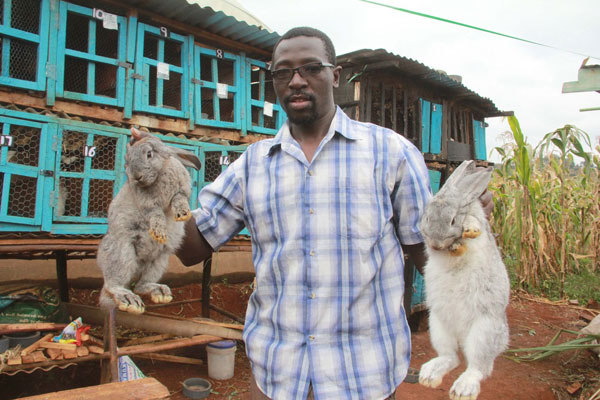David Githaiga walks to his rabbits coop carrying a bunch of grass mixed with weeds and sukuma wiki, which rabbits love to eat.
As soon as he opens the door of the pen, the rabbits rush to the door.
He scoops some of the feeds and gives the rabbits, which start nibbling. He then walks to a nearby water tap, draws some water in a tin and returns to the coop to give the rabbits.
“I am happy they are now doing well,” says Githaiga who is based in Nyeri. “I hope I will overcome the loss because I do not want to lose more animals.”
Githaiga is recovering after losing 60 rabbits last month to a strange disease that invaded his coop. His brood has now dropped to 60.
“My animals had increased significantly since rabbits reproduce first, but I am now back to almost where I started because of the strange disease.”
A veterinary officer identified the disease as Mucoid enteropathy or Mucoid enteritis. It is a deadly bacterial disease that can wipe out an entire brood.
The disease, according to experts, affects weaning kits mainly, but can also attack adult rabbits. Death among rabbits suffering from the disease is high and one should take immediate action if the animals are to survive.
The symptoms include fever, diarrhoea and loss of appetite. Normally, the rabbits droppings are covered with a clear jellylike mucous.
The rabbits stop eating and become dehydrated and bloated as the disease affects the digestive system. The rabbit may also squeal, and grind its teeth.
IT ALL STARTED WITH ONE BUCK
For Githaiga, it all started with one buck, which he had given a fellow farmer to serve his does.
“The animal returned with the disease and since I mixed it with others, it spread, particularly in the coop it was in.”
The farmer watched as his rabbits dropped one by one.
“With the veterinary officer, I separated the healthy rabbits from the sick ones. This prevented the disease from spreading. However, we could not save the other rabbits because all the medicine we administered did not work,” says Githaiga, who ventured into farming early last year with Sh8,000 savings.
CAUSE UNCLEAR
Dr Paul Okumu a rabbit pathologist at the University of Nairobi, says Mucoid enteritis is a deadly disease whose cause is unclear.
He advises farmers to maintain good hygiene, which consequently helps in reducing chances of the rabbits and their young ones contracting the disease and others like bloat.
Bloat is caused by poor maintenance of the rabbit structures and by giving the animals fresh green grass. “It’s important for a farmer to allow the green plants to dry first before feeding. This helps in reducing the chances of them contracting diseases like bloat and Mucoid enteritis.”
He asks farmers, especially those who feed their animals weeds, to add supplements to the greens and ensure that the rabbits are getting a balanced diet.
He added that cross-breeding of the different types of rabbits helps in increasing the disease-resistance.
“There is no specific drug to treat Mucoid enteritis. Whether your rabbits get the diseases or not depends with what you do.”
Githaiga says he no longer feeds his animals plants when he gets them straight from the farm. “I ensure that they dry first. Besides that I clean the coops after two days. I give them maize germ, pollard and growers which helps them to gain weight fast,” says the farmer, who also plants vegetables in greenhouses on his one-acre farm near Dedan Kimathi University, Nyeri.
He keeps five different types of rabbit breeds that include New Zealand, California White, French Earlobe, Chinchilla and the Flemish Giant. He is now cross-breeding them as he searches for hardy breeds.
Githaiga mainly sells his rabbits to farmers who want to venture into the trade at Sh600 for young ones. He also sells rabbit meat at between Sh350 to Sh400 per kilo.









